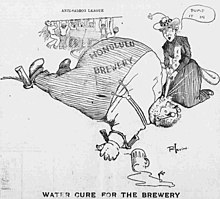begin quote from:
https://en.wikipedia.org/wiki/Prohibition#United_States
United States[edit]
Prohibition in the United States focused on the manufacture, transportation, and sale of alcoholic beverages; exceptions were made for medicinal and religious uses. Alcohol consumption was never illegal under federal law. Nationwide Prohibition did not begin in the United States until January 1920, when the Eighteenth Amendment to the U.S. Constitution went into effect. The 18th amendment was ratified in 1919, and was repealed in December 1933 with the ratification of the Twenty-first Amendment.[43]
Concern over excessive alcohol consumption began during the American colonial era, when fines were imposed for drunken behavior and for selling liquor without a license.[44] Protestant religious groups urged Americans to curb their drinking habits for moral and health reasons. By the 1840s the temperance movement was actively encouraging individuals to immediately stop drinking. However, the issue of slavery, and then the Civil War, overshadowed the temperance movement until the 1870s.[45]
Prohibition was a major reform movement from the 1870s until the 1920s, when nationwide prohibition went into effect.[46] The Women's Crusade of 1873 and the Woman's Christian Temperance Union (WCTU), founded in 1874,[44] were means through which certain women organized and demanded political action, well before they were granted the vote.[47] The WCTU and the Prohibition Party were major players until the 20th century, when the Anti-Saloon League emerged as the movement's leader. By 1913, 9 states had statewide prohibition and 31 others had local option laws in effect. The League then turned their efforts toward attaining a constitutional amendment and grassroots support for nationwide prohibition.[44]
A new constitutional amendment submitted by Congress in December 1917[48] prohibited "the manufacture, sale, or transportation of intoxicating liquors within, the importation thereof into, or the exportation thereof from the United States and all territory subject to the jurisdiction thereof for beverage purposes".[49] The amendment was ratified and became law on January 16, 1919.[44] On October 28, 1919, Congress passed the National Prohibition Act, also known as the Volstead Act, which provided enabling legislation to implement the 18th Amendment.[50] After a year's required delay, national prohibition began on January 16, 1920.[44]
The illicit market soon grew to about two-thirds its pre-Prohibition levels.[51] Illegal stills flourished in remote rural areas as well as city slums, and large quantities were smuggled from Canada. Bootlegging became a major business activity for organized crime groups, under leaders such as Al Capone in Chicago and Lucky Luciano in New York City.[52]
Prohibition lost support during the Great Depression, from 1929.[53] The repeal movement was initiated and financed by the Association Against the Prohibition Amendment, and Pauline Sabin, a wealthy Republican, founded the Women's Organization for National Prohibition Reform (WONPR).[54][55] Repeal of Prohibition in the United States was accomplished with the ratification of the Twenty-first Amendment on December 5, 1933. Under its terms, states were allowed to set their own laws for the control of alcohol.[54][55]
Between 1832 and 1953, federal legislation prohibited the sale of alcohol to Native Americans, with very limited success. After 1953, Native American communities and reservations were permitted to pass their own local ordinances governing the sale of alcoholic beverages.[56]
In the 21st century, there are still counties and parishes within the United States known as "dry," where the sale of alcohol is prohibited or restricted.[57]


No comments:
Post a Comment